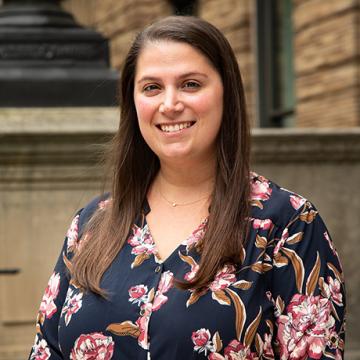

About:
I am a social psychologist and teach courses on social psychology, the psychology of gender, and research methods. Broadly, my research is motivated by a desire to understand processes that allow us to have positive and productive group interactions without feeling excluded or pigeon-holed by our social identities. I care deeply about providing an excellent education that prepares students to be leaders in their lives, conducting research that addresses the ways in which bias and feelings of exclusion can be barriers to success, and collaborating meaningfully with students on this work.

Laura Rossi has been a member of the Simmons faculty since 2017 preparing seniors students for the transition to professional practice. Dr Rossi Is certified by the American Nurses Association (ANA) as Clinical Nurse Specialist in Adult Health and focused her clinical practice on care of patients with cardiovascular disease. More recently, she has been actively engaged in advancing quality and patient safety efforts at MGH. Her research interests are focused on improving clinical reasoning skills and redesigning models of care delivery. She is active in many professional organizations where she has held many positions locally, nationally, and internationally.
Selected Text:
Person-Centered Models for Cardiovascular Care: A Review of the Evidence: A Scientific Statement From the American Heart Association. https://doi.org/10.1161/CIR.0000000000001141Circulation. 2023;148:512–542
As our population ages and experiences more complex health issues, health systems are challenged with capacity issues and a variety of metrics that do not consistently assure equity and access to the quality of care we expect. This paper helps us understand how effectively our current systems are working and the gaps that must be addressed to improve our current systems.
I would also like to acknowledge a text to which I contributed 2 chapters:
Population-Based Nursing, 4th ed, Springer, 2024 edited by, A.L., Niedz, B.A., and Erikson, A.
This award-winning text has been widely recognized for addressing contemporary issues and standards for nursing. The new edition will expand on cutting edge topics related to technology and program development, particularly as practice settings expand beyond the hospital into the community.

About:
Christina teaches across the social work curriculum. Her teaching includes required and elective courses in both the online and on campus MSW program, and intervention research in the PhD program. Christina has expertise in clinical interventions with at risk youth and training in intervention research and implementation science. Her research is at the intersection of substance use and suicide, particularly among adolescents and young adults. Christina has extensively published in academic journals such as Addictive Behaviors, LGBT Health, and Psychiatry Research. Her recent work has been funded by the American Foundation for Suicide Prevention.
Selected Text:
Joiner, T. (2005). Why People Die by Suicide. Harvard University Press.
I selected this book because Thomas Joiners theory, the interpersonal theory of suicide drives much of my understanding of suicide and how I think about suicide prevention efforts. This book helps to destigmatize one of the most stigmatizing topics and experiences and I believe every social worker has a responsibility to think critically about their biases and beliefs regarding suicide.

About:
Erica Moura is an award-winning and Emmy nominated multimedia journalist. During her nearly two decade long career she has covered the tragedy at Sandy Hook Elementary School, she was at the finish line of the Boston Marathon when the bombs went off, and the 2016 Presidential election in New Hampshire.
She brings these experiences to her classroom while guiding students to interrogate the current ethical codes and definition(s) of objectivity in the journalism profession.
Selected Text:
"Whose View" by June Cross, Columbia Journalism Review
https://www.cjr.org/60th/
In my opinion, objectivity is a fickle friend and it shifts significantly based on who is in the room. June Cross captures this sentiment eloquently in her column “Whose View” for the Columbia Journalism Review. Cross showcases the pitfalls of not reflecting on what the goal of journalism is and how objectivity does(n’t) fit with that goal.